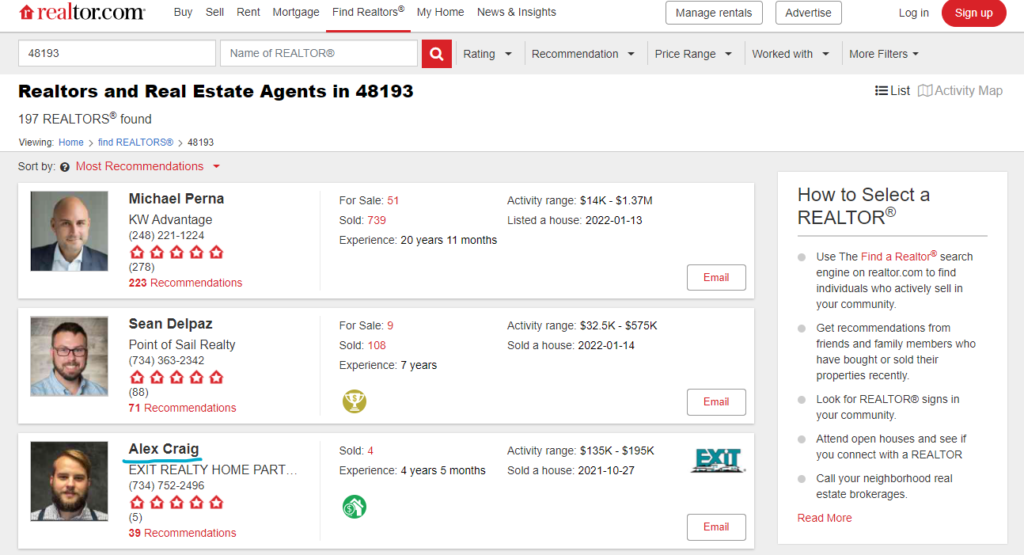There are a million and one reasons prospective realtors wonder if they can be successful as part-time real estate agents.
Maybe it’s because you’re working a full-time job and merely want to test the waters when it comes to real estate. Or, perhaps you’re retired and you’re looking for something to do part-time to keep busy.
Or, you’re a mom looking to do real estate part-time while balancing school pick ups or diaper changes and naps.
Whatever the reason, most people want to know if it’s possible to be successful as a part-time real estate agent before making the commitment — in time and money — towards getting their real estate license.
We’re going to talk about being a part-time realtor in this article. We’ll also talk about the benefits, some of the challenges you will face, and tips for succeeding as a part-time agent.
Let’s go, yo.
Pros To Part-Time Real Estate
Being a part-time real estate agent lets you “test drive” the industry.
If you’re thinking about becoming a real estate agent, going part-time can help you decide if you want to make a full career transition. Like, going from a nurse to real estate agent.
Test it before you commit.
A part-time status can reduce financial risk if you plan to keep your job. Let’s be real for a sec, real estate can be an expensive career. You’re treated as an independent contractor. So, you’re responsible for association fees, MLS fees, and other fees.
These can easily add up. Having a paying job and doing real estate part-time reduces the financial burden and risk that going into real estate full-time causes.
Okay, but we’re here to answer one question: can a part-time real estate agent be successful?
What Is Success?
Before we can really answer the question many are wondering, we have to find a common definition for success. Without knowing the definition of success, it’s hard to get an accurate and reliable answer to the question.
Success looks different and means something different for every single person. One person might consider success in real estate as selling five homes a year. Another person might define it as making $45 an hour when everything is said and done, regardless of the number of homes they sell.
One struggle with coming up with a definition is being too specific. Being too general creates issues, too.
In an effort to find a balance, I came up with a definition for success that I’m going to use for this article. I encourage you to adopt this definition when thinking about going part-time in real estate.
If you decide not to, that’s fine. At least adopt it while reading this article so that we’re all on the same page.
My Definition Of Success
Here’s my definition:
You’re successful as a part-time real estate agent if you feel the job and your activities devoted to real estate are financially and emotionally worth it.
I feel like this definition encompasses everybody’s definition of success and accounts for various differences.
To expand, I propose that success is subjective and is about whether you feel it’s worth it. For some, part-time real estate needs to bring an emotional release and acts as a hobby.
For others, part-time real estate better bring in a certain amount of income.
What does this look like? It means that showing homes on a weekday after a long workday is financially and emotionally worth it to you. Or, missing your nephew’s birthday party to meet a potential client for an appointment is worth it to you.
Each person will place different values on other areas of their lives and time.
Whatever they feel is worth it, the same strategies remain the same. Here’s what you can do to be successful as a part-time real estate agent.
Challenge #1: Limited Time For Real Estate
The biggest challenge working any job part-time, especially real estate, while balancing full-time work is finding enough time to do everything.
Your time will be stretched thin and limited in all areas of your life or certain responsibilities will be delayed or deleted. For example, it might mean getting the kids Little Caesars pizza for dinner while you’re on your way home from a late showing that took 20 minutes longer than you anticipated.
It might mean choosing not to work with a client so that you can attend your child’s sports game on the weekend. These are all very real tradeoffs that will have to be made.
When you’re doing real estate part-time in addition to everything else, your time is limited. For that reason, you need to automate, outsource, or consider joining a team.
Automate & Outsource
There is a service provider or automating technology for almost every single task you would do as a real estate agent.
Want to automate email newsletters? There are different email marketing softwares available to real estate agents. Your sponsoring broker may even provide a platform for you to automate your marketing.
Need to automate your social media posting? While not automatic, there are software solutions that allow you to schedule posting. Allowing you to set a week’s worth of posting in advance and on your schedule.
There are also Inside Sales Agents (ISA) to call your leads and administrative support that will process transactions for you. Some brokers offer these kinds of value-added services.
Of course, it’s not free. There is a cost to them.
Some costs won’t make sense to you. As a part-time real estate agent, you will find a constant tradeoff between your time and money.
If real estate is taking up too much of your time and you want it back, you may need to buy it back. Or, go through a stressful period until all of your clients have closed on their homes.
Either way, your time is limited. Automating and outsourcing can be excellent solutions for having a life while doing real estate part-time and working full-time.
Consider Joining A Team
Joining a real estate team can be a great way to pursue real estate part time. That has to do with the way teams are often structured.
A team typically contains a team leader who generates all of the leads. They have an assistant and administrative staff that can handle a lot of the day-to-day tasks and transaction process.
When you join a real estate team, you have access to these resources. Allowing you to focus on getting clients, showing homes, taking listings, and negotiating contracts.
Every real estate team has a different structure. On some teams, you’re going to pay, often in lower commission splits to you, to access these resources.
For example, if you work solo, a common commission split is 70-30 for new agents. When you join a team, a 50-50 team split plus a 70-30 broker split is common.
Effectively, this results in a 35-65 split for a real estate agent on a team.
If you sell an average home worth $260,000 at three percent commission, the total gross commission income is $7,800. As a solo agent, you would earn $5,460. On a team, that amount would decrease to $2,730.
That may be worth it to you. It might not. Again, it’s a balance between time and money. You will have to determine if you should join a real estate team or go solo.
On a team, you make less on the average deal, but it takes less time to complete. That could be what you need if you’re working full-time and trying to be a part-time realtor.
Challenge #2: Clients Might Not Trust Part-Time Realtors
Trust is an important element to any real estate transaction. Asking people to use your realtor services is a big ask. It requires a lot of trust. You’re asking someone to trust in you and your services for one of their largest assets and financial decisions.
Being a part-time real estate agent will count against you. It can lead people to draw inaccurate conclusions about your services, competence, and ability to do the job successfully.
However, there are things you can do to build trust so that being a part-time agent doesn’t cause you to lose out on potential clients.
Get Reviews And Testimonials
Reviews and testimonials form a strong foundation in building trust. You need to make it a priority to get reviews, recommendations, and testimonials before you have any clients.
You might be thinking… “that’s a catch-22. How do I get clients with reviews if I don’t have clients to give reviews?”
There are two main ways. First, ask your friends to leave you recommendations on profiles that allow it. Examples include Realtor or LinkedIn.
Realtor.com allows real estate agents to collect reviews and recommendations. While reviews are better, recommendations will go a long way.
I personally did this as a new realtor before I had any clients. It allowed me to become a top-recommended realtor on Realtor.com.

I asked friends and vendors to leave me recommendations. A lender would ask me out for lunch; I would go and meet them. They pitched me their lending services and I requested a recommendation.
All of them were happy to help out.
Get Client Reviews Without Clients
Second, you don’t need to close on a home before asking for a review. This works out in two ways.
You can ask current clients you’re working with for reviews or ask people that you help with real estate in any capacity.
For example, I would always ask clients for reviews once an offer was accepted. One friend asked me for real estate advice. I gave it to them. In return, I asked that they leave me a review about my advice that I provided.
They were happy to do so.
In another example, I had a real estate agent on my team who was prospecting FSBOs with letters and calls in early 2017.
The agent connected the FSBO to a real estate photographer. She was focused on providing value above making the sale.
So, it’s no surprise that the FSBO — even though he sold his home — was happy to provide a review for her. She didn’t make a dime off the homeowner but got a stellar five star review.
The point of these examples is to give you an idea of ways you can get reviews without closing clients.
A solid review profile will help you build trust. You don’t need many reviews, as most agents don’t put much effort in building a solid review platform.
Turn Reviews Into Videos
Video is the most powerful form of digital communication. It’s going to be far more powerful than reviews.
If you’re serious about a career in real estate, I recommend making the investment in video testimonies and case studies.
You can do it on the low end using Zoom and recording your conversation with a client. On the high end, you can create testimonial videos like I have for my company
It will require a decent investment, around $1,000 to $2,000 per video. The exact price will depend on your service provider and your market.
However, these videos have long lives. Even after five years, I still use these videos on Facebook, my website, and in my email marketing newsletters.
Of course, this requires a client. You won’t be able to use the review and testimonial strategy I outlined.
But, if all goes well, you can easily do this with your first client.
Be Consistent And Frequent
Consistency and frequency, even without reviews or video testimonials, goes a long way in building trust. Meaning, by showing up regularly and consistently, you can build trust.
For example, this might mean sending an email newsletter every week. It might mean making real estate Facebook posts every day.
The point is that you show up on a consistent schedule that you picked. It also means having the same message and allowing people to see it over and over again will go a long way.
This is where the concept of niching comes into play. If you’re not familiar, the idea of niching is about picking a specific market and marketing to them.
For example, you might target first-time home buyers. Or, more specifically, you might target first-time home buyers looking to leverage low down payment lending options, like MSHDA.
Or, you have decided to specialize in probate and help adult-children and executors who need to sell a home as a requirement to settle probate.
When you’re new or a part-time agent, there is a lot of temptation to target and market to everyone. But, you’re violating rules of consistency, and therefore, hurting your trust.
Focus down. Focus often. And be consistent.
Reframe Part-Time
Lastly, you can reframe your part-time status. There are some clients that will see it as a major disadvantage, but you can flip the script and sell it as an advantage.
For example, if you’re a part-time agent who recently retired, you could tell your clients that you will have more time for them than the average full-time agent.
You can give them a more personal touch, are easier to work with, and easier to get a hold of.
Full-time agents have a problem with busyness. Sometimes full-time agents can be hard to reach via phone and email. They might be swamped with work and haven’t effectively learned how to delegate some of their tasks.
If you read negative reviews about real estate agents, you will often see the lack of communication or personal touch as a common message.
Challenge #3: Brokers Might Not Hire You
There are real estate brokers that will not hire a part-time real estate agent. This will limit your pool of potential sponsoring brokers.
Whether a real estate broker will hire a part-time realtor comes down to the brokerage’s approach to real estate and their financial model.
When you go looking to get sponsored by a real estate broker, you will find each brokerage, even those within the same franchise system, to be unique. They will all have a different philosophy and financial model.
Some real estate brokers won’t hire part-time agents because they don’t believe they can be successful. Others will hire you only if you have a plan for going full-time. Still, others won’t care and will gladly welcome part-time agents.
As a general rule, the real estate companies that are eager to hire part-time real estate agents are the brokers that charge their agents a lot of fees and where they make their revenue from fees.
That’s because the brokerage will earn revenue off you and be profitable, regardless of your production. However, this is going to increase your monthly fixed costs.
Meaning, every month you could find yourself paying $100, $200, or $500 every single month, regardless of whether you sell a home or not.
Find The Right Brokerage
At the end of the day, you want to find a real estate brokerage where your monthly fixed costs are minimal. Instead, you want variable expenses and to be charged only when you close on a home and make money.
This could be a big broker or it could be a small brokerage. You will have to go through the work to properly align yourself with the brokerage that will support your goals as a part-time real estate agent.
That’s not easy, but it’s possible.
Challenge #4: Full-Time Costs
Part-time real estate often has a full-time cost. You’re not necessarily saving any money.
For example, you still have to pay the same fees to the National Association of Realtors that full-time agents do. You still have to pay the same monthly MLS access fees and local board fees.
Continuing education requirements are the same, and may cost you more if you’re unable to squeeze in the free opportunities throughout the year.
You can easily expect to pay around $3,000 a year (or more) to be a part-time real estate agent. The same cost as a full-time agent.
And, we didn’t even talk about brokerage fees you will pay.
From a cost perspective, being a part-time agent isn’t an advantage.
Have Variable Costs
As a part-time real estate agent, to avoid paying the same cost as a full-time agent, you need to make sure your expenses and fees are variable.
Your fees should be based on transactions closed. Not a monthly fixed cost, like a desk fee, regardless of your production.
For example, Exit Realty doesn’t charge a monthly desk fee. You pay a transaction fee upon closing of a home.
This is a better model for a part-time real estate agent rather than joining a brokerage with an $85 per month brokerage fee.
So, when looking for a brokerage, try to find one with more variable expenses rather than fixed. Even if it ends up costing you more in the long run.
You’re reducing your risk and allowing yourself to succeed as a part-time real estate agent rather than having all of your cash eaten upfront every single month.
Challenge #5: Competition With Full-Time Agents
When you choose to be a part-time agent, you will still be competing with full-time real estate agents in the market.
For example, if you both have Zillow leads, you may get the same lead. Then, you will find yourself competing with an agent who has more time to follow up with that lead. By being part time, you risk losing out on leads and clients.
Plus, in the current real estate market, homes are selling fast. Agents have to be fast to tour homes and write offers. That can be hard to do as a part-time agent if your time is limited when you can show homes. You may lose out on homes for your clients.
There’s only one solution for this really… that’s to go full-time.
Have A Plan For Going Full-Time
It’s my strong belief that there is no point to being a part-time real estate agent unless you count it as a hobby. The reality is that if you’re doing it as a side hustle to make extra money, it’s often not worth it.
That’s because as a part time real estate agent, you still have many of the expenses that a full-time agent has. You will need to pay MLS fees, desk fees, technology fees, and member association fees.
These all add up to around $3,000 to $5,000 per year. That’s not a small chunk of change. In my area, a new agent would have to sell at least one to two homes to break even.
You need to develop a plan for going full-time. Ideally, your broker can help you with this.
Final Words
A lot of real estate agents go part-time because of concern about success. I understand. It’s a solid strategy to work part-time as a real estate agent to reduce risk. However, it’s better to have a plan for going full-time if you want to be a realtor long-term.
Exit Realty exists to build strong real estate agents and make them successful. Too many brokers focus on the numbers and production rather than the individual.
You’ll find that Exit takes a different approach. We believe in working to strengthen each agent and make them successful.
Exit is built on a culture that is focused on the agent. It’s a supportive culture. We mentor and encourage each other like a family would do.
We are a real estate company with a heart!




